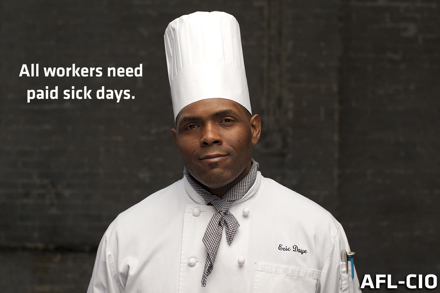
In most of the developed world, when people get sick or have a sick child, they take a sick day and take care of themselves and their families, keeping their co-workers, customers and clients safe. And they rest comfortably, knowing that getting sick won’t mean they can’t pay the rent or provide their children with needed school supplies. That’s the way it should be. In most of the advanced world, paid sick days are a right that protects working families, while at the same time boosting businesses and the economy.
But not in the United States. More than 44 million Americans—42% of the workforce—don’t have a single day of paid sick leave, and nearly one-fourth of America’s workers say they have been fired or threatened with job loss for taking an unpaid sick day.
The importance of paid sick days for working families is obvious, but what does it mean for the public? And what does it mean for businesses? As it turns out, paid sick leave isn’t just valuable for workers; it helps everyone.
Paid sick leave, for example, addresses a major public health concern. When employees go to work sick, they handle our food, they bag our groceries and they drive our taxis. In short, they could make the rest of us sick. And this isn’t just a guess; we have the numbers to back it up. During the H1N1 flu outbreak in 2009, it is estimated 7 million people caught the virus from co-workers.
Many businesses support paid sick leave, even when they aren’t required to by law. Smart business owners know that healthy and happy employees are good employees.
Family Values @ Work and the Main Street Alliance talked to businesses a while ago and found plenty of reasons why employers support paid sick leave.
Employees who can take paid sick days are less likely to go to work when they are ill, which means they are less likely to infect co-workers and customers.
"People had no choice but to come into work with the flu and get everyone else sick," said Leni Juca of experiences with past employers. Juca owns Oxium Print and Copy in Queens, N.Y. “With a small business like this one, we can’t afford to get each other sick," he said.
Healthy employees are also more productive.
"If people feel secure and happy when they come to work, they will want to keep working and helping the business succeed," said Makini Howell, chef-owner of Plum Bistro in Seattle.
Employees with sick leave are less likely to develop more serious ailments that require missing more work, lowering health care costs for employers. The policy also helps with worker retention and cuts costs for recruitment and training. It just makes sense that healthier workers are happier workers and they are more likely to enjoy their jobs, stay with them and perform better. In that case, everybody wins. It’s estimated that replacing a worker costs an employer 25% to 200% of the employee’s total compensation. All in all, offering workers up to seven paid sick days a year would save the U.S. economy an estimated $160 billion in lost productivity and another $1 billion in medical expenses.
Offering the paid sick day benefit "helped build a partnership of trust between employee and employer," said Dewetta Logan, director/owner of Smart Beginnings Early Learning Center in Philadelphia. "I believe having time off when you’re sick is a right—not something a worker should have to beg for." Logan offers her employees sick leave despite Philadelphia not requiring it.
Some members of the business community say requiring paid sick leave is burdensome, costs too much and is too difficult to implement. But the experience of places that have adopted paid sick leave requirements—San Francisco, Washington, D.C., Seattle and the state of Connecticut—shows these fears are unwarranted. Employment in the most affected industries has risen, and more than 80% of the employers surveyed—even during the Great Recession—said the new requirement didn’t hurt their profits.
In San Francisco, where the policy has been in effect since 2007, 23% of workers took no sick leave at all and the remaining workers averaged using no more than half of their possible sick days in the years after the ordinance passed. Two-thirds of San Francisco businesses now support the policy, and businesses in the city have thrived. In 2011, PricewaterhouseCoopers rated San Francisco the third-best city in the world in terms of business climate.
Let’s connect the dots now. Good for workers, good for families, good for public health and good for businesses. Let’s make paid sick leave happen.


The views and opinions expressed in this post are those of the author(s) and do not necessarily reflect those of MomsRising.org.
MomsRising.org strongly encourages our readers to post comments in response to blog posts. We value diversity of opinions and perspectives. Our goals for this space are to be educational, thought-provoking, and respectful. So we actively moderate comments and we reserve the right to edit or remove comments that undermine these goals. Thanks!